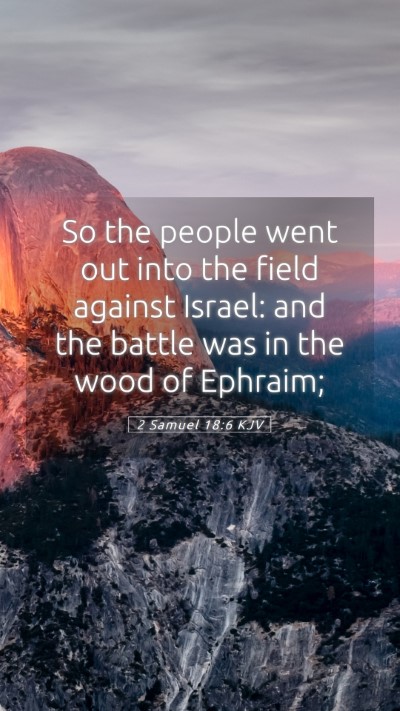Understanding 2 Samuel 18:6
In this passage, we see a critical moment in the narrative of King David's reign, where in 2 Samuel 18:6, the armies of Israel face off against one another in a significant battle. This verse marks a turning point that is laden with emotional and theological significance. Below, we consolidate insights from various public domain commentaries, including those of Matthew Henry, Albert Barnes, and Adam Clarke, to provide a comprehensive understanding of this scripture.
Bible Verse Context
2 Samuel 18:6 states:
"So the people went out into the field against Israel; and the battle was in the wood of Ephraim."
Commentary Insights
-
Matthew Henry's Commentary:
Henry emphasizes the gravity of the conflict, marking it as a divine judgement on Absalom's rebellion against his father, King David. The "wood of Ephraim" serves to symbolize not just the physical geography but the spiritual and emotional turmoil surrounding David's kingship and familial discord. Henry reflects on how battles fought in wooded areas can often be chaotic and unpredictable, mirroring the moral ambiguity of Absalom's defection.
-
Albert Barnes' Notes:
Barnes provides an operational context, stating that the battle represents the culmination of Absalom's attempt to usurp the throne from David. He points to the significant role geography plays in this encounter—often battles fought in constricted spaces lead to confusion and greater casualties. This detail underscores the dire consequences of Absalom's insurrection and serves as a forewarning of the inevitable tragedy that follows.
-
Adam Clarke's Commentary:
Clarke notes the emotional weight borne by David as he watches the strife unfold among his own people. He underlines the notion of familial strife, noting that David's heart would have been heavy, burdened not just as a king but as a father. This commentary invites readers to reflect on the personal ramifications of leadership in times of turmoil, a poignant reminder of the human cost behind political conflict.
Key Themes and Applications
-
Divine Justice:
This battle serves as a backdrop for reflecting on divine justice. The struggle between David and Absalom is not just a familial dispute but also represents a larger conflict between adherence to God's will versus rebellion.
-
Consequences of Sin:
Absalom's plot against David's throne is a clear illustration of the destructive nature of sin and rebellion. The ensuing battle is a direct result of pride and ambition gone awry, inviting readers to consider the dangers of defying God’s authority.
-
Emotional Burden of Leadership:
King David's turmoil highlights the emotional and spiritual burdens that leaders carry, a relevant theme for anyone in positions of authority today.
Related Bible Cross References
- 2 Samuel 15:1-12 - Absalom's conspiracy against David.
- 2 Samuel 16:15-23 - The arrival of Absalom to Jerusalem and the counsel of Ahithophel.
- 2 Samuel 17:1-14 - The advice of Ahithophel against David and the subsequent decision of Absalom.
- 2 Samuel 19:1-8 - The aftermath of the battle and David's mourning for Absalom.
Conclusion
The study of 2 Samuel 18:6 requires deep engagement with its themes and implications. By understanding the context and commentary, individuals in Bible study groups or those engaging in online Bible study can gain a profound insight into both the narratives of the Old Testament and their contemporary applications. This verse stands as a testament to the complexities of human nature, leadership, and the pursuit of judgment and justice under divine sovereignty.
Further Study Recommendations
For more extensive study, the following Bible study tools and Bible study resources can help:
- Bible study guides and commentaries for deeper analysis.
- Bible study lessons focusing on leadership and moral dilemmas.
- Bible study topics surrounding family relationships and conflicts.


